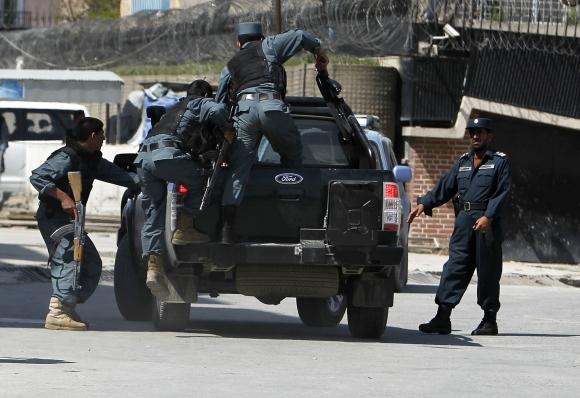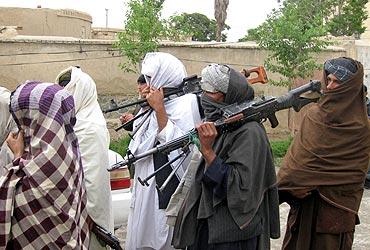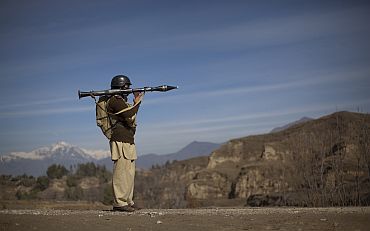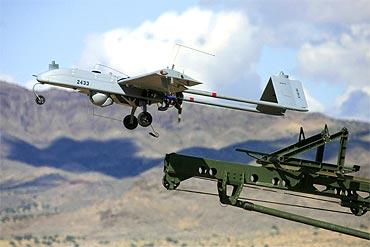Photographs: Omar Sobhani/Reuters Tahir Ali in Islamabad
The United States is likely to turn up the heat on Pakistan following the alleged involvement of the Haqqani network in the Kabul attacks, says Tahir Ali.
Attacks carried out allegedly by the Haqqani network on different targets in Kabul, including the American embassy, has widened the rift between Washington, DC, and Islamabad.
The attacks have come at a time when both countries were trying to settle their troubled relations following Nato's November 24 airstrike that killed 24 Pakistani troopers.
Sunday's attacks that lasted 18 hours is not only the beginning of the Taliban's fresh 'spring offensive' but is also a matter of great concern for the United States and its allied forces in Afghanistan. Terming it as a 'show of strength', the Afghan Taliban also carried out attacks in other eastern provinces of Nangarhar, Logar and Paktia.
"The fact that terrorists were able to enter Kabul and other provinces was an intelligence failure for us and especially for Nato," said Afghan President Hamid Karzai's office in a statement.
...
For Realtime News on the Haqqani network, click here
Hillary Clinton urges Pak to squeeze Haqqani network
Photographs: Reuters
The Taliban attacked the Afghan parliament building, embassies in the diplomatic area including the British and the German, a supermarket and a newly-completed hotel. About 19 militants including suicide bombers were killed in the attack. Two were captured and 14 police officers were wounded along with nine civilians.
Though the death toll was relatively low considering the scale of the assault, it highlighted the ability of the militants to strike high-profile targets in the heart of the city even after more than 10 years of war.
As Sunday's attack is being termed a big success for the Taliban, Pakistan would feel the heat in the coming days especially after the US alleged that the Haqqani network was behind the assault. "We had received a great deal of intelligence that the Haqqanis were planning these kinds of attacks," said US Defence Secretary Leon Panetta.
US Secretary of State Hillary Clinton has also urged Pakistan to squeeze the Haqqani network. She telephoned Pakistan's Foreign Minister Hina Rabbani Khar and discussed the likely fallout of the attacks. She added that there were already indications of Haqqani's involvement in the weekend attacks on Kabul and elsewhere in Afghanistan which is a very 'determined foe'.
The Haqqani network is headed by Sirajuddin Haqqani, the son of afghan veteran jihadist Jalaluddin Haqqani. Despite Sirajuddin being a member of the Al-Qaeda central Shura, the Haqqani network is a strong part of Mullah Omer-led Afghan Taliban. The organisation has more than 12,000 well-trained fighters. These include experts in guerilla warfare, explosives and bomb-makers, snipers, suicide bombers, and teachers to indoctrinate the youngsters. The group is also fully equipped with all the modern weaponry needed for guerrilla warfare.
The network is strong on both sides of the Pakistan-Afghanistan border, and its control centre is reportedly located in North Waziristan. Earlier, its members were found in North Waziristan, but now it has been spread to Kurram, Bajaur, Mehmand and Orakzai agencies. In Afghanistan, the network controls Khost, Paktika, Paktia, Logar and Ghazni provinces of Afghanistan and has now extended its activities to Kabul and its surroundings.
...
Pakistan unlikely to take on Haqqani network
Image: A Pakistani soldier at Khar in Pakistan's FATA regionPhotographs: Adrees Latif/Reuters
Although Islamabad will be under pressure from the US, Rahimullah Yousafzai, an expert in Pak-Afghan affairs, thinks that Pakistan could easily sustain the pressure and there was no chance of any military action against the Haqqani network.
"Haqqani network is always blamed whenever such attacks take place; blaming Haqqanis and indirectly blaming Pakistan. The US, a number of times, has asked Islamabad for action against the militant outfit but the latter has resisted. If any action was taken against the Haqqani network in the past, there would be no pressure on Islamabad today."
According to Yousafzai, in the present scenario, Pakistan would never go after the Haqqanis. "In the given situation Pakistan would not take on Haqqani, as the US itself is asking the Afghan Taliban for peace talks, so how can Pakistan start a new offensive? Islamabad would never agree to this US demand," he added.
The Kabul incident is a matter of concern for all Nato countries that are planning to leave while claiming to restore peace in war-torn Afghanistan.
Nato's foreign and defence ministers will hold a meeting on Wednesday at Brussels to lay the groundwork for a summit hosted by US President Barack Obama in Chicago on May 20-21. The meeting will map out the troop pullout over the next two years and debate how to fund the Afghan forces.
Nato leaders agreed in the Portuguese capital to gradually hand over security responsibility to Afghan security forces, with the aim of completing the transition by the end of 2014.
...
Kabul attack will be an excuse for US to continue drone strikes
Image: An unarmed US 'Shadow' drone is launched in this undated photographPhotographs: Reuters
The fresh attacks by the Taliban is a matter of serious concern to the North Atlantic Treaty Organisation. It would be discussed during the upcoming meetings of Nato but I don't think it will bring any change to the date (end of 2014) of withdrawal of foreign troops from Afghanistan," said Yousafzai.
Some Pakistani analysts say that accusing the Haqqanis for the Kabul attacks is a ploy to hide the failure of the Afghan and Nato forces in maintaining peace in the country.
Talking to rediff.com, defence analyst General (retired) Talat Masood said, "At the moment it seems like a blame game because immediately after the attack Pakistan was blamed. If there is any proof about the involvement of militants with Pakistani background, it should be presented."
Commenting on the statements of Panetta, Masood said, "It is ironic that if there was such information, why was there no retaliation? It is a complete failure of the Afghan and Nato intelligence, and to divert attention from security lapse, Pakistan has been blamed."
Defence analyst Dr Ayesha Siddiqa thinks that the Kabul attacks would not directly affect Islamabad-Washington bilateral ties, but it would provide an excuse to the US to continue drone strikes inside Pakistani tribal areas.
Pakistan has closed Nato supplies through its route following the latter's airstrikes that killed 24 Pakistani soldiers. However, last week Pakistani parliament passed new recommendations regarding Pak-US ties that include demands such as an immediate end to US drone strikes and prohibiting the use of Pakistani airspace for transportation of arms and ammunition to Afghanistan.
"The recent attack in Kabul would apparently not disturb the Pak-US bilateral relation but it would provide a justification to the US to carry on its drone strikes inside Pakistani tribal areas. I think US would not end the drone strikes, especially after this fresh incident," Dr Siddiqa said.





article